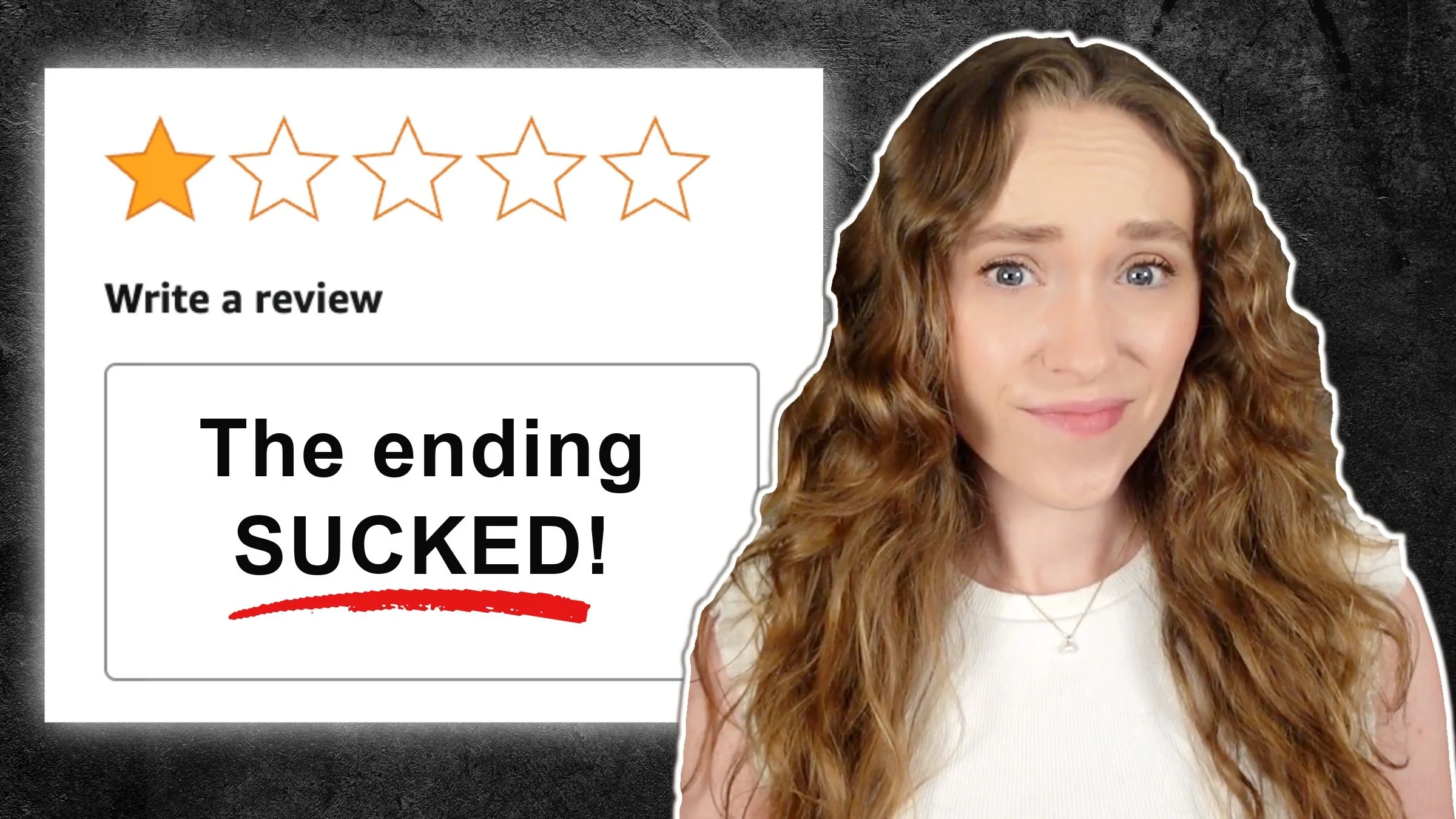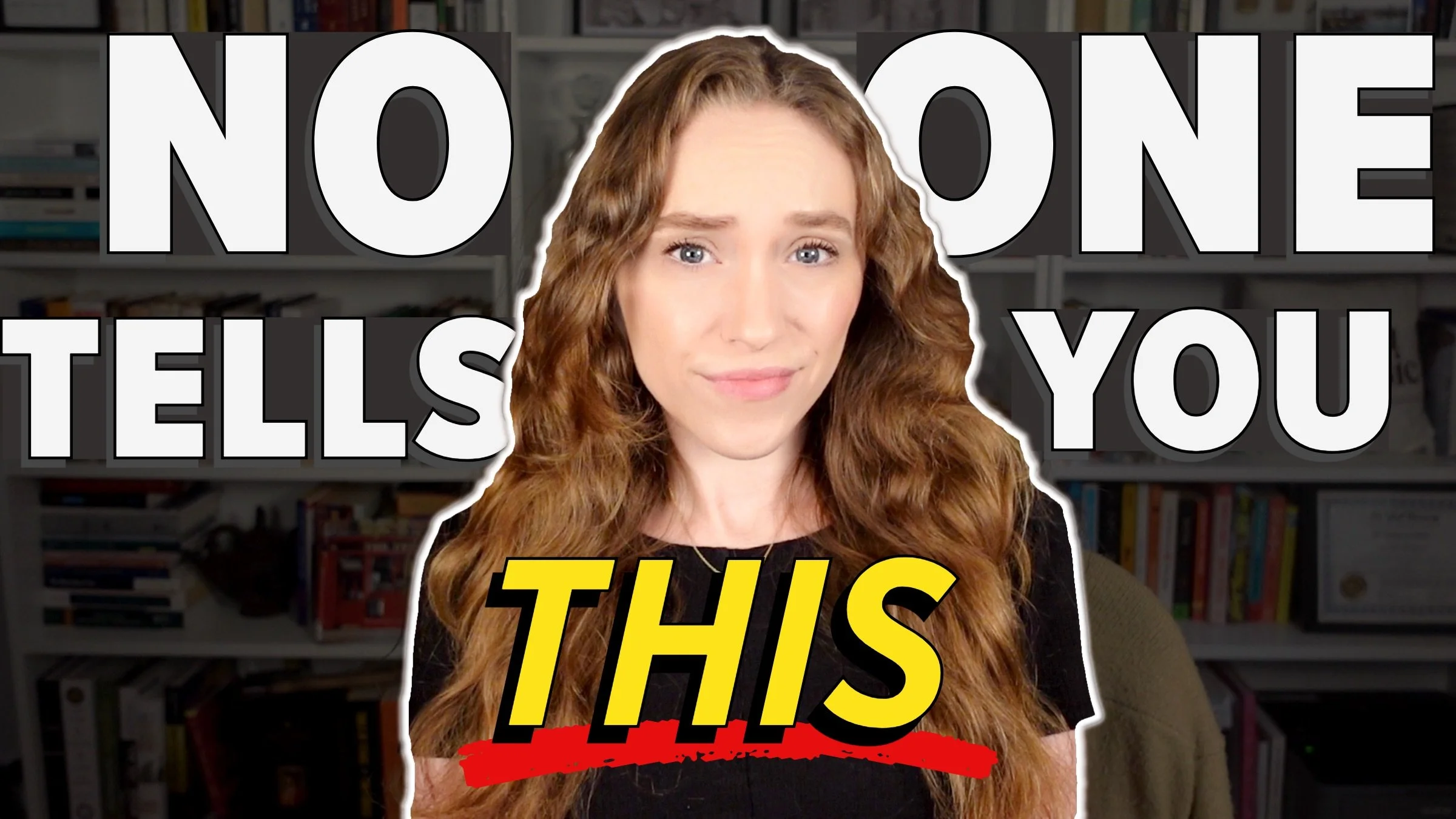7 Harsh Truths Every Writer Needs to Know About Revising
HIT PLAY OR READ THE POST BELOW:
I hate to break it to you — typing "the end" on your manuscript doesn't mean you're finished with your book. In fact, this is where the real work begins. Revision is where you truly find your story, you deepen your characters, you tighten your plot, and you develop your voice. It's arguably the most important part of your writing process.
But here's the problem: too many writers go into the revision process unprepared, so they rush it, or they get lost in it, or worse, they avoid it entirely. If you've found yourself floundering, not knowing what to do with your draft next, you've come to the right place. Today I'm sharing seven harsh truths about revision that you must internalize and understand to elevate your story and make it the best version it can be. And I promise by the end you won't dread revisions — you'll actually be excited about them.
1. Pretty sentences won't fix a broken story.
When most authors think about revising, they picture red marks on their manuscript pages correcting grammatical and spelling errors, but that's actually a very narrow part of the entire revision and editing process, and it should come at the very end. Because making every single sentence sparkle now is like repainting a car that has no engine—sure, it'll look nice, but it won't actually drive.
If you spend hours upon hours smoothing out every sentence at the early revision stages, you're just wasting your time. Because if you end up making a major change to the plot, you're likely going to have to revise significant portions of the manuscript. You might throw out certain scenes entirely or completely rewrite them, so all that work you did to refine all those sentences is going to be for nothing.
You have bigger fish to fry first. So when you have a fresh draft ready to revise, you need to focus on the big picture to make sure the entire story holds up. As a developmental editor, I evaluate not just the line-level writing but the overall story to ensure it delivers the author's intended impact and that the read is engaging from beginning to end.
Here are some questions I ask when I'm evaluating manuscripts:
Is there sustained conflict throughout all parts of the story?
Are the stakes high enough?
Does the protagonist undergo a meaningful transformation?
Does the plot feel believable and convincing?
Do the climax and resolution deliver a strong emotional impact?
If your plot, characters, and pacing aren't working, no amount of beautiful writing is going to save your story. Make sure you're asking the hard questions about your story and prioritizing the edits that are going to make a real difference first.
2. If you're not killing your darlings, you're not going deep enough.
You've heard the phrase "kill your darlings." But are you actually applying this to your manuscript? In my career, I've never edited a manuscript where we didn't end up cutting something — a scene, a secondary character, a flashback. In the most extreme cases, sometimes we end up cutting an entire storyline or perspective. Because if you're truly embracing the full scope of the revision process, you know that you need to find the heart of your story and pare back everything that isn't serving it — even if it's beautifully written, even if it features a character you love, even if it contains your best line.
Your job during revisions is not to protect the sentences that you love; it's not to prove that everything you wrote all those weeks or months ago deserves to stay on the page. Your job is to elevate your story so it delivers a powerful reading experience. That means every single scene needs to earn its place in the manuscript — and I guarantee there's something in there that needs to go.
But it doesn't need to be gone forever. Put it in a "cutting room floor" document where you compile snippets or scenes that don't make it into your final story; they might find a new life in a future story. If you're on the fence deciding whether a scene belongs, ask yourself, "If I cut this scene, what actually changes?" The answer might be nothing. Is this moment actually impacting the story, or is it just here because I like it? Don't let your personal attachment to a scene get in the way of a tighter, more powerful story.
3. Without feedback, you're flying blind.
You simply can't revise effectively in a vacuum. You're too close to your story. You know what you mean to say, so you can't see those places on the page where what's written is not matching up with your intention. You can't see parts that are unclear, moments where your character perplexes us, or scenes that aren't landing emotionally. You will never be able to read your manuscript objectively or like a first-time reader. That's why even best-selling authors who are masters of their craft understand the value of getting external feedback.
You need trusted readers to illuminate your blind spots and help you focus the direction of your revisions. You don't know what you don't know. But here's where getting feedback goes wrong: don't ask just anyone. Your spouse or mom or best friend might have trouble giving you honest feedback because they don't want to hurt your feelings. And even if they are honest with you, they might struggle to phrase their feedback in such a way that it's helpful and constructive.
Instead, turn to beta readers, a critique partner, or a professional editor. Ultimately, find people who have solid editorial instincts, who read in your genre, and who understand what you're trying to accomplish with your story. That doesn't mean you should take every single suggestion they throw at you, but try to understand the "why" behind their feedback. Once you know the root of the issue and can see your own blind spots, you'll know what to target in your revisions.
4. Revision requires discipline and direction.
Revising without a plan is like hiking in the woods without a map; you'll feel productive until you realize you've been walking around in circles for an hour, and now you're just tired and hungry. That's why you need systems to understand where your story is working and where it still needs work; these serve as your guideposts or trail markers.
One of my favorite tools for revision is the reverse outline. Here's how it works: you create a document that summarizes what happens in every single scene in chronological order. It's tedious to create, but it's going to be a hugely helpful tool and reference point as you dive into your revisions to keep you on track. You might realize, as you put together your reverse outline, that a subplot you introduced in chapter 5 never got resolved, or that there are three scenes back-to-back in the middle of the story where nothing actually happens, or that the inciting incident happens far too deep in the story. If you have multiple timelines or multiple perspectives in your novel, a reverse outline is a must, because it helps you ensure you're balancing them effectively.
I've worked with clients who take the reverse outline very seriously and flesh them out into multi-column spreadsheets. For example, I had one client who had a master spreadsheet that listed what happened in the scene, the characters who were present, the setting, the point of the scene, and the themes that it touched on. Then, once I delivered my feedback, they added a column noting what needed to be changed in each scene. This gave them a detailed roadmap for exactly what to do in their next draft, scene by scene. You don't need to create a document that detailed for your revision to be effective if it doesn't suit your process, but at least try to make a checklist of what you intend to achieve on the next draft.
5. There is no such thing as a quick fix.
I wish I could give you a magic button that instantly turns your messy draft into a masterpiece that tops all the bestseller charts. But writing is an art precisely because there is no shortcut. It requires blood, sweat, and tears. Real revision takes time. Sometimes it takes just as long to revise as it did to write the novel in the first place — sometimes even longer.
The reason it takes so long is because no one can complete the revision but you. Sometimes writers think that as an editor, I will take their manuscript, rewrite it myself, and somehow, with the magic touch of my hand, turn it into a story worth publishing. But even if you work with an editor, they're not your fairy godmother — they're your coach. You are still the one putting in the effort because you're ultimately the visionary of the story, and deep down you're the only one who truly knows what it needs. I can point you in the right direction, illuminate those blind spots you can't see, and help you position it in the market, but it's ultimately your name on the cover for a reason.
Anytime someone tells me they completed a new draft within a week or two, I immediately question the depth of their revisions. If you're working on developmental editing (the big-picture stuff that really takes your story to the next level) it should take a minimum of a few weeks or months. Sometimes it even takes a year or more. Quick fixes usually mean you've only done superficial edits, the type of stuff we talked about in the beginning, and you'll just end up with a shinier version of the same broken manuscript. So don't rush the process. I promise it will be worth it.
6. Revising is not a linear process.
I wish that revising was as easy as checking off items on a grocery list. But in reality, it's more like untangling a spiderweb. The more you pull one thread, other parts start to unravel. You changed a piece of backstory, and now you have to revise all the character's reflections on their past. You altered a relationship, and now you have to revisit all the conversations those characters have. And just when you think you've got everything working, you realize that you deleted a subplot in the last draft that you actually need, so now you have to put it back in.
Welcome to the chaos of the revision process. You might rewrite a scene in draft 3 only to revert back to the original version that you had in draft 5. That doesn't mean you did anything wrong; it's just the nature of the beast. This is also precisely why the revision process takes so long, and some books need more drafts than others. I once worked with a client who was on their 55th draft of their manuscript — no joke. That's just how long it took that author to truly develop and refine the story. So let go of the idea that each draft gets you closer and closer to the final product in a perfectly straight line. Trust that as long as you are getting a deeper understanding of the story you're trying to tell, you are progressing.
7. Your manuscript will never be perfect.
There will always be a line you could tweak to sound better, a scene you could smooth out, a character you could develop further. But at a certain point, revising becomes counterproductive. I've seen brilliant writers get stuck in revision purgatory, where they're too afraid to share their work or query agents because they don't feel it's perfect yet. They tell themselves, "It's not ready, it's not ready." But really they're just being fearful. These questions are rattling around in their mind: What if it gets rejected? What if it's not good enough? What if I fail?
If you're harboring these fears masked as perfectionism, listen up. Know that agents aren't looking for perfect manuscripts because they know that doesn't exist. They're looking for powerful, well-written stories with strong potential. So how do you know when it's time to stop revising? When your beta readers, critique partners, or editors are giving you more minor notes rather than major story-level feedback. When you're changing things back and forth just for the sake of it. When you realize your changes aren't really making the story better — just different. Those are your signals to take the leap. Go ahead and query it. See what happens. Because if you wait until your manuscript is absolutely perfect, you'll guarantee that no one will ever read it.
Know that it's completely normal to feel overwhelmed about the revision process. Revision is hard. It's emotional. It challenges your ego. It reveals every vulnerability in your story and your skill set. But here's the good news: if you're willing to put in the work, you will be far ahead of most writers, and your story will only get better from here.





